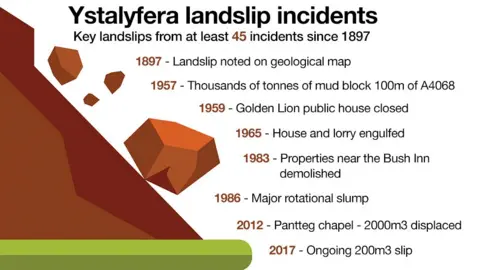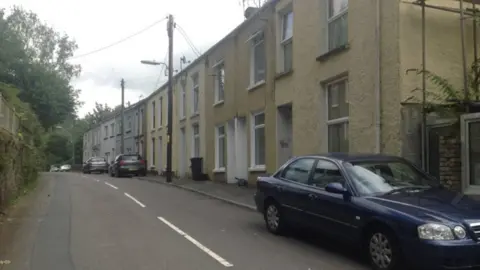Ystalyfera landslip: Q&A on issues affecting homeowners
 BBC
BBCFollowing a series of landslips and with "no immediate solution" in sight, what does the future hold for those displaced from homes in Ystalyfera?
A row of houses in the Neath Port Talbot village has been evacuated and one empty home has been earmarked for demolition.
About 20 people have been forced out of their homes and up to 150 properties could be affected.
So what are the issues facing residents and what could happen next?

 Google
GoogleLay of the land
As is typical in the Welsh valleys, many homes in Ystalyfera are built into the hillside.
About 3,000 people live in the village and it was once home to several mines.
Pwllback Colliery, Varteg Colliery, Tirbach Slanta and Taneri Colliery in neighbouring Godrergraig were among the mines dug in and around Ystalyfera.
Neath Port Talbot Council leader Rob Jones said the "whole area has a legacy of geographical faults - it is a heritage of the mining industry".


The history
Council records show landslides and boulder falls have dogged the area for 120 years.
The first documented case was in January 1897 when a landslide was noted on a geological map.
Since then, there have been at least 45 recorded incidents, including roads being blocked, homes being damaged and, in May 1965, a house and lorry was engulfed on Graig Road.
This is not the complete picture as there were no records kept from November 1986 to December 2012.
However, in that month, thousands of tonnes of rock, soil and trees slipped down the hillside behind the homes, followed by a further two landslides this year, causing some gardens to drop away.
Mr Jones has admitted it is impossible to predict when or where the next landslide will happen.

 John Emery
John EmeryWhat will happen to the houses?
When the council evacuated people from 10 homes - numbers 81 to 96 - on Cyfyng Road, they were told there was an "imminent risk" to their lives.
The council has admitted there is "no engineering solution" for them, but two households have refused to budge.
The other two were derelict and it is one of these which has been earmarked to be pulled down. One group who left their home are still in a B&B but the council said they were in the process of moving into appropriate accommodation.
One option available is compulsory purchase orders (CPO).
This allows the state or a public body to acquire land and buildings when "it is in the public interest".
Typically, they are issued for major projects or developments, as was the case when the UK government announced 16 homes on a new housing estate in South Yorkshire would be demolished to make way for HS2.
Even if people do not want to sell, they can be forced to, but they must be compensated and that figure is negotiated between homeowners and the authority taking possession of their home or land.
Mr Jones said he would have "no hesitation" in going down this route to "save people's lives".

 Getty Images
Getty ImagesCounting the cost
Property website Zoopla lists the average value of a home on Cyfyng Road as £72,611 in August 2017 - however, it remains to be seen what impact this latest landslide will have on property value.
Just by being served with the notice to evacuate, the council said people could claim home loss compensation.
However, anyone who owns their home will need to continue paying their mortgage and if the landslip has a big impact on house prices, this could push people into negative equity.
This happens when the price of a property falls so dramatically it is no longer worth as much as the loan taken out on it.
Homeowners are then often unable to sell as they will not be able to repay what they owe, while the lender no longer has enough value in the house to cover the loan it issued.
Also, recent landslips have to be declared on any applications for home insurance and are viewed in similar terms to subsidence.
This may mean people will struggle to get a policy from one of the mainstream lenders and could have to go a specialist insurer.
And legally?
The council has legal powers to serve enforcement notices. which owners have to follow, to protect the health and safety of occupiers.
These can range from improvement notices requiring alterations or making a property safe, to an emergency prohibition order which requires occupiers to vacate the properties immediately.
It is the latter notice which has been served to the 10 properties on Cyfyng Road.
If residents fail to comply, the council has the power to prosecute and magistrates can fine anyone found guilty of the offence.
